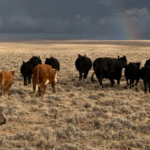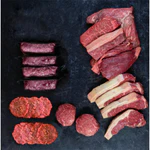Do you know what’s in your beef? It’s important to know where our food came from if we want quality nutrient-dense food that matters. Also, you should be able to taste the difference. Did you ever wonder about the beef you are eating? I LOVE a good steak…that’s a very special meal for me. I’m also on the lookout for a great burger. Taste is everything. I also want great quality. But when you’ve had a bad steak or a so-so burger, you know you don’t want it again. When food is more than just food…it’s also an experience…then you know you’ll want the best. In other words, “quit trusting labels and trust your tongue!” Nutrient-dense food matters when you are looking for great taste too.
Why Feed Corn to Cows?
Before WWII, cows were never fed corn. They were grass-fed, and most Americans had never eaten corn-fed beef. When demand and production of grain increased during the war, it decreased and farmers had too much grain. Subsidizing certain crops (corn, for example) guaranteed payment for farmers at that time, and continued producing a huge amount of these crops. While Americans were eating more meat and spending less on food, the large amount of these grains led to the idea of using them to fatten up cows quickly. The norm in America then acquired corn-fed beef.
Money, efficiency, and speed are needed for most of today’s cattle producers in America. To produce a lot of beef quickly for the least amount of money is the reason why 97% of commercial cattle producers feed their cows corn. It takes a very long time (years) to fatten cows naturally on grass. When fed corn, cows get fat quicker (more like 6 months) as opposed to years. Since corn is higher in calories and fat, cows get fatter faster, which then produces beef quicker, therefore, making more money. This kind of beef is more affordable, as a result. Most of this beef has the marbling (fat) that many people like. Big corn farms are then necessary to keep these cattle fed.
What’s Wrong With Feeding Corn To Cows?
The plant matter of grass is more fibrous, better for the cows’ stomachs, and has better overall nutrients that have been lost over time. Because of the unique way cows digest their food, they can suffer from a plethora of health issues including bloating, inflammation, and ulcers to name a few, due to the unnatural diet of corn, grain, and other “mysteries” added to the feed. “Feather meal” is ground-up poultry feathers, for example, and by-products like this are also added to the unnatural way cows are eating. Not to mention diseases that can result in fatal illnesses. Think about putting that meat into our bodies. What do you think it does if it is not fed naturally? People are exhibiting many health issues because of their food. You can see here that what we eat affects our health. This is why a certain family decided to venture outside of the norm of cattle production, and in turn, has some of the most nutrient-dense food on the planet.
Nature Matters!
“Soil and soul” go hand-in-hand when you are a rancher wanting to be the one who provides the high-quality nutrients your beef should have. Nature matters, NOT the big corporations. The science of animals who eat what they should naturally eat matters. In turn, they become the nutrient-dense food our bodies need. That place is an arid mountainous, but fragile as an ecosystem, and the climate and region house the most powerful grasses in the world.
When we say don’t trust the label, that seems shocking. We always read our labels, but what if the label seems ok but it doesn’t taste good? We think we are getting food that’s good for us. Instead of trusting the labels, what if you trusted yourself and your eating experience? What if that beef has been verified as some of the most nutrient-dense beef in the country? That sounds like a better option for a great-tasting meal experience. In other words, “your tongue does not lie.”
What Is Grass-Fed Beef?
Just because a product is labeled “grass-fed,” doesn’t necessarily mean cows were grass-fed their entire lives. When you see the term “grass-fed,” that means the cattle ate grass at the beginning of their lifecycle. It was only started on grass, but then in addition, fattened up by receiving other supplemental grain feed (such as corn, etc.) in feedlots for the rest of their lives. It doesn’t necessarily mean the cattle were pasture-raised. Commercial agriculture wants the cows fattened up quickly because the weight of the beef depends on their compensation. In addition, the USDA does not require cattle to have a full grass-fed diet to get the “grass-fed” label on beef packaging. “Grass-finished,” on the other hand, is cattle that only ate grass and forage their entire lives. Big corn farms, then, do not take up more of the environment, because they are not necessary.
Good Nutrient-Dense Beef Is Like a Fine Wine
Great-tasting beef is raised slowly within its natural environment. These ranchers don’t even harvest young animals like the rest. They are harvested 4-14 years of age. Think of your beef like a fine wine. The older it is, the better. These cows are leaner, giving their meat a different flavor. It’s healthier because it contains the “good fats.” Nature is the key because when beef is a nutrient-dense food, it simply is going to taste and smell better. Soil is essential to the foundation on which these natural grasses will grow and on which the cattle will graze.
For those generations who came before us, we can learn how these vast grasslands are essential to our existence. For the ones who ranched before us, this was typical in ranching. This wonderful family is bringing it back to how it should be. Their ranch is located on the western slope of the Big Horn Mountains. Among 40,000 wild acres and natural springs, these lucky cows get to graze on the finest natural rangeland in the world. They graze on a wide diversity of grasses growing in rich soil. They live for twice as long, creating nutrient-dense food with their bodies. In turn, when produced naturally, it is the best-tasting beef.
When choosing a good beef, you’d want to know where it came from and you want good quality.
Just like a fine wine, the long process it takes to be great beef comes from nature’s bountiful arena. A family of ranchers who believe in taking care of the land first, then taking care of their cattle with that land produces a product unlike any other. The nutrient-dense foods they create from the land they care for feed their cattle grazing on it. As you take your next bite of steak or bite into a burger, you’ll now know how important nature is in creating a great quality product. Not only will it taste delicious, but it will also be an excellent quality nutrient-dense beef you’ll feel good about feeding to your loved ones.
The Amazing Food Experiences
While you enjoy that amazing beef dinner, try pairing it with some wine as a bonus! Meals should be experiences, and when you’ve got the best, it’s a nice way to celebrate your daily blessings. One family, whose careful and purposeful ranching has produced quality meats to share with our family who is sharing it with YOU. Now is the time to enjoy the experiences you get to experience with food that will turn an ordinary meal into memories in no time.
If you love good quality food from farm to table, check out the differences between duck and chicken eggs, as well as store-bought vs. fresh from the farm. If you like knowing where you get your eggs, just like knowing where you get your beef, then check this out! We love supporting our local businesses!
Don’t forget to reach out and contact us for more information. Once you are added to our Online Community, you’ll benefit even more! Contact us HERE!


